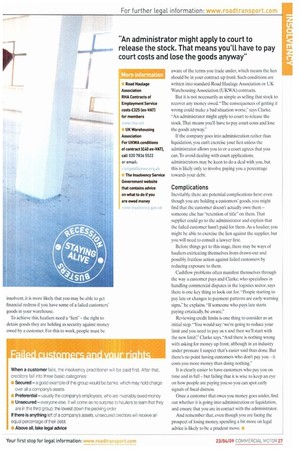Credit crunch customer crisis
Page 26

Page 27

If you've noticed an error in this article please click here to report it so we can fix it.
In these tough economic times, hauliers face increasing risk from customers going bust. What are your rights when such a catastrophe happens?
Words: Adam Hill
It's a sad fact of business life not least in this economic turmoil that customers will go bust owing you money. Hauliers can't influence the financial health of other companies, but there are steps that can be taken when you spot the early warning signs of a customer going to the wall, and there are also ways you can give yourself the best chance of receiving what you are owed.
Insolvency falls broadly into two areas: liquidation and administration. It's worth bearing in mind the difference between liquidation, which is a final procedure whereby a company ceases trading as part of a plan to wind it up completely, and administration, where the firm continues trading in the hope of creating a viable entity that will be able to carry on.
In the first instance, assets are liquidated and distributed among creditors; but with an administration there are numerous restrictions placed on the company's assets.
If there is anything left of a company's assets after secured and preferential creditors have been dealt with, unsecured creditors (the group of creditors in which hauliers are most likely to sit) will receive the same percentage rather than an equal share of their debt. So, if £100,000 was all that remained and there were Elm-worth of unsecured creditors, each would get 10% of what they were owed.
Creditors' meeting
There is nothing to stop you going to a creditors' meeting, although there is not much benefit in doing so unless you know, for instance, that there is something dodgy going on that the administrator is not aware of.
"They are often poorly attended," says Nick Clarke, partner at law firm Aaron & Partners "And they can turn into shouting matches. But if you are the major unsecured creditor, you may be able to influence who is appointed in a liquidation for example, someone you know rather than the people the directors have chosen.
-It's more of a psychological point you might feel better but it will have no impact in pushing you up the list,he says.
While it is possible that you will be in the process of delivering a customer's goods when you hear that it is insolvent, it is more likely that you may be able to get financial redress if you have some of a failed customers' goods in your warehouse.
To achieve this, hauliers need a "lien"— the right to detain goods they are holding as security against money owed by a customer. For this to work, people must be aware of the terms you trade under, which means the lien should be in your contract up front. Such conditions are written into standard Road Haulage Association or UK Warehousing Association (UKWA) contracts.
But it is not necessarily as simple as selling that stock to recover any money owed. "The consequences of getting it wrong could make a bad situation worse," says Clarke. "An administrator might apply to court to release the stock. That means you'll have to pay court costs and lose the goods anyway."
If the company goes into administration rather than liquidation, you can't exercise your lien unless the administrator allows you to or a court agrees that you can.To avoid dealing with court applications, administrators may be keen to do a deal with you, but this is likely only to involve paying you a percentage towards your debt.
Complications
Inevitably, there are potential complications here: even though you are holding a customers' goods, you might find that the customer doesn't actually own them — someone else has "retention of title" on them. That supplier could go to the administrator and explain that the failed customer hasn't paid for them. As a haulier, you might be able to exercise the lien against the supplier, but you will need to consult a lawyer first.
Before things get to this stage, there may be ways of hauliers extricating themselves from drawn-out and possibly fruitless action against failed customers by reducing exposure to them.
Cashflow problems often manifest themselves through the way a customer pays and Clarke, who specialises in handling commercial disputes in the logistics sector, says there is one key thing to look out for. "People starting to pay late or changes to payment patterns are early warning signs," he explains. "If someone who pays late starts paying erratically be aware," Reviewing credit limits is one thing to consider as an initial step, "You would say: 'we're going to reduce your limit and you need to pay us x and then we'll start with the new limit" Clarke says. "And there is nothing wrong with asking for money up front, although in an industry under pressure I suspect that's easier said than done, But there's no point having customers who don't pay you — it costs you more money than doing nothing."
It is clearly easier to have customers who pay you on time and in full — but failing that it is wise to keep an eye on how people are paying you so you can spot early signals of fiscal distress.
Once a customer that owes you money goes under, find out whether it is going into administration or liquidation, and ensure that you are in contact with the administrator.
And remember that, even though you are facing the prospect of losing money, spending a bit more on legal advice is likely to be a prudent move. ft
















































































































































